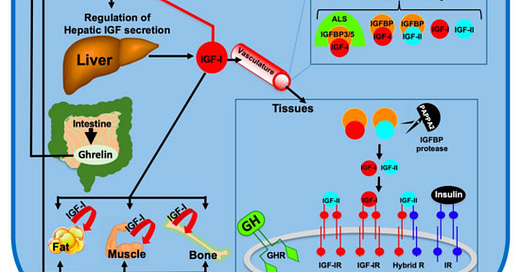All my IGF-1 experiments
2025 is all about IGF-1 maxxing for me.
Why IGF-1 is so important
Most people think IGF-1 is all about building muscle, but it’s much more important than that.
It:
Increases LH receptors in the Leydig cells
Stimulates 5-alpha reductase. DHT upregulates 5AR, and the mechanism of action is by increasing IGF-1. Blocking the IGF-1 receptor prevents DHT from increasing 5AR.
Increasing androgen receptors
Prevent mitochondrial dysfunction
Promotes mitochondrial biogenesis
Stimulates mitophagy (mitochondrial autophagy - the process of removing damaged mitochondria, which is important for maintaining mitochondrial health and function and extending health span.
Decreases cell senescence, prevents DNA telomere shortening, and reduces mitochondrial DNA damage, suggesting an anti-aging effect.
Reduces free radical production and increases anti-oxidant enzymes like catalase, SOD and glutathione peroxidase.
Enhances thyroid hormone production
Promotes hair growth and enhances skin health (elasticity, thickness, hydration, etc.)
How GH/IGF-1 is being made
It starts with the hypothalamus, which releases GHRH (growth hormone–releasing hormone).
GHRH signals the pituitary gland to release growth hormone (GH) into the bloodstream.
GH travels to various tissues—especially the liver, where it stimulates the production of:
IGF-1 (Insulin-like Growth Factor 1) – supports muscle growth, repair, and regeneration.
IGF-binding proteins (IGFBPs) – carry and stabilize IGF-1 in the blood.
Acid-labile subunit (ALS) – helps form a stable complex with IGF-1 and IGFBPs.
Proteins like PAPP-A and PAPP-A2 release IGF-1 from this complex so it can act on tissues.
Feedback regulation:
IGF-1 tells the pituitary to reduce GH release (negative feedback loop).
Somatostatin (from the hypothalamus) also blocks GH and other hormone release.
Ghrelin, the “hunger hormone,” increases when you’re fasting and:
Stimulates appetite.
Triggers more GH release from the pituitary.
Where’s my IGF-1 at (as of the 3rd of March 2025)
Back in early 2023, I mega-dosed Tongkat Ali—20 capsules per day of the 10% eurycomanone extract from Nootropics Depot. The result?
My GH and IGF-1 levels crashed to 0.06 ng/mL and 90 ng/mL, respectively.
For context, most healthy young men have:
GH: 2–3 ng/mL
IGF-1: 200+ ng/mL
The reference range for GH is 0.4–10 ng/mL, and for IGF-1 it's 115–307 ng/mL.
So I was clearly at rock bottom. My GH could be classified as deficient, yet my IGF-1 was surprisingly decent given those GH levels.
Without intervention, my GH tends to hover around 0.06 ng/mL, and my IGF-1 sits near 100 ng/mL. The highest I’ve been able to reach so far is 150 ng/mL.
Below are the results from my experiments (starting from the beginning).
P.S. I’ll keep updating this post as I run more tests.
Quick word before we get into it: I won’t be responding to comments here, because I simply don’t have the time for it.
I’m able to help you best when I do research, experiments and create content.
If you want a specific solution to a specific problem, check out my courses here.
If you’d like closer access to me, join TestoTribe. I’ll respond to all questions there and we also do a live weekly Q&A coaching call.
Alternatively, you can book a consultation here.




